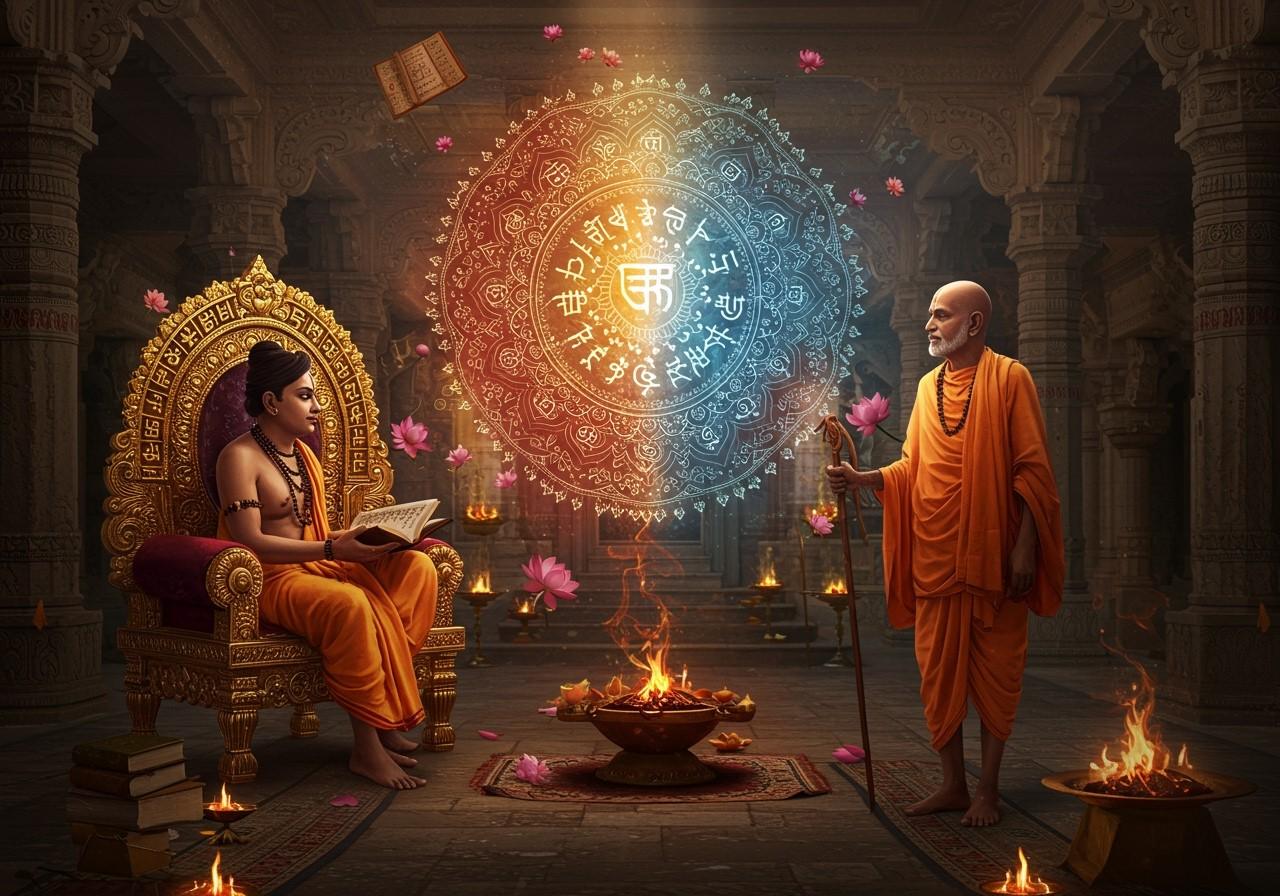
Kumārila Bhaṭṭa and Śaṅkarāchārya, two monumental figures in Hindu philosophy, engaged in a discourse on Dharma, the principle of cosmic order. This dialogue holds immense significance for those seeking to understand the nuances of tradition and ritual within Hinduism. By exploring their perspectives, we gain a deeper appreciation for the richness of Hindu philosophical thought and its impact on cultural practices.
Kumārila Bhaṭṭa’s Philosophical Stance
A champion of the Mīmāṃsā school, Kumārila Bhaṭṭa (7th century CE) stressed the paramount importance of Vedic rituals. He posited that Dharma is eternal, self-evident, and enshrined within the Vedas. He argued that meticulous performance of these rituals is crucial for upholding the balance of the cosmos. His work included rigorous defenses of Vedic authority against challenges from other schools of thought, particularly Buddhism. He critically engaged with prominent Buddhist philosophers like Dharmakirti and Dignaga.
- Contributions to Mīmāṃsā: Kumārila Bhaṭṭa’s work centered on interpreting the Vedas to understand the precise nature of Dharma and the correct performance of rituals. His commentaries are considered foundational texts within the Mīmāṃsā school.
- Belief in Dharma: He believed that Dharma is not a human construct but an intrinsic part of the universe, revealed through the Vedas. This eternal Dharma dictates the proper conduct for individuals and society.
- Critique of Buddhism: Kumārila Bhaṭṭa vigorously defended Vedic orthodoxy against the arguments of Buddhist philosophers, asserting the primacy of Vedic knowledge and the efficacy of rituals.
Śaṅkarāchārya’s Philosophical Stance
Śaṅkarāchārya, a central figure in Advaita Vedānta, presented a contrasting perspective. He taught that the perceived material world is an illusion (Māyā) and that true liberation (Moksha) comes from realizing the ultimate reality of Brahman. He argued that rituals, while potentially helpful, are ultimately insufficient without the understanding of this fundamental unity.
- Contributions to Advaita Vedānta: Śaṅkarāchārya systematized the non-dualistic philosophy of Advaita Vedānta, emphasizing the oneness of the individual self (Atman) and the ultimate reality (Brahman).
- View on the Material World: He considered the material world a temporary illusion, a product of ignorance (Avidyā). True knowledge lies in transcending this illusion and realizing the non-dual nature of reality.
- Critique of Mīmāṃsā: While acknowledging the role of rituals, Śaṅkarāchārya prioritized the pursuit of spiritual knowledge (Jnana) as the primary means to liberation. He argued that true Dharma lies in understanding the ultimate truth, not merely performing rituals.
The Debate on Dharma
The core of the debate between Kumārila Bhaṭṭa and Śaṅkarāchārya lies in their definitions of Dharma. Kumārila Bhaṭṭa viewed Dharma as adherence to Vedic injunctions and the performance of rituals, while Śaṅkarāchārya defined Dharma as the realization of the unity of existence. This divergence highlights the tension between action (Karma) and knowledge (Jnana) in Hindu philosophy.
- Definitions of Dharma: The differing interpretations of Dharma highlight a fundamental philosophical divide – the emphasis on ritualistic action versus the pursuit of spiritual knowledge.
- Role of Rituals: Kumārila Bhaṭṭa saw rituals as essential for maintaining cosmic order and achieving liberation. Śaṅkarāchārya, while not dismissing rituals entirely, believed they are secondary to the realization of Brahman.
- Implications for Practice: The debate between these two philosophers continues to shape contemporary Hindu thought and practice. It raises questions about the relative importance of ritual observance and spiritual understanding in the pursuit of Dharma.
Kumārila Bhaṭṭa: Life, Influence, and Legacy
Kumārila Bhaṭṭa’s life, though shrouded in some mystery, reveals a deep commitment to Vedic tradition. His scholarship and staunch defense of Vedic authority significantly influenced subsequent generations of Mīmāṃsā thinkers.
- Early Life and Education: Details about Kumārila Bhaṭṭa’s early life are scarce, but it’s evident he received a thorough education in Vedic scriptures and philosophical traditions.
- Influence on Mīmāṃsā: His commentaries on the Vedas and his systematic exposition of Mīmāṃsā philosophy established him as a leading authority within the school.
- Legacy of Vedic Preservation: Kumārila Bhaṭṭa’s work played a crucial role in preserving and transmitting Vedic knowledge and ritual practices.
Śaṅkarāchārya: Life, Influence, and Legacy
Śaṅkarāchārya’s life, though relatively short, was marked by extraordinary intellectual and spiritual achievements. His teachings on Advaita Vedānta revolutionized Hindu thought and continue to inspire seekers today.
- Early Life and Education: Śaṅkarāchārya displayed exceptional spiritual insight from a young age, mastering Vedic scriptures and embracing the monastic life.
- Influence on Advaita Vedānta: He established Advaita Vedānta as a dominant force in Hindu philosophy, clarifying its core tenets and refuting opposing viewpoints.
- Legacy of Non-Dualism: Śaṅkarāchārya’s teachings on non-dualism and the illusion of the material world have profoundly influenced spiritual seekers for centuries.
Poojn.in: Supporting Your Spiritual Journey
At Poojn.in, we offer a wide selection of products to support your exploration of Hindu philosophy and practice. Whether you’re drawn to the ritualistic focus of Mīmāṃsā or the spiritual insights of Advaita Vedānta, we have resources to enrich your journey. Explore our collection of Lord Shiva murtis, sandalwood incense, camphor, and other sacred items.
Conclusion
The dialogue between Kumārila Bhaṭṭa and Śaṅkarāchārya provides invaluable insights into the multifaceted nature of Dharma. Their contrasting perspectives enrich our understanding of the interplay between ritual practice and spiritual knowledge within Hindu tradition. By studying their teachings, we can gain a deeper appreciation for the complexities of Dharma and find guidance on our own spiritual paths.

